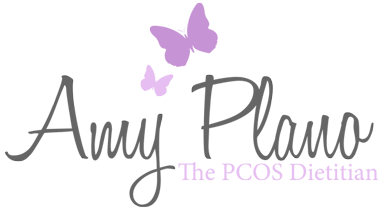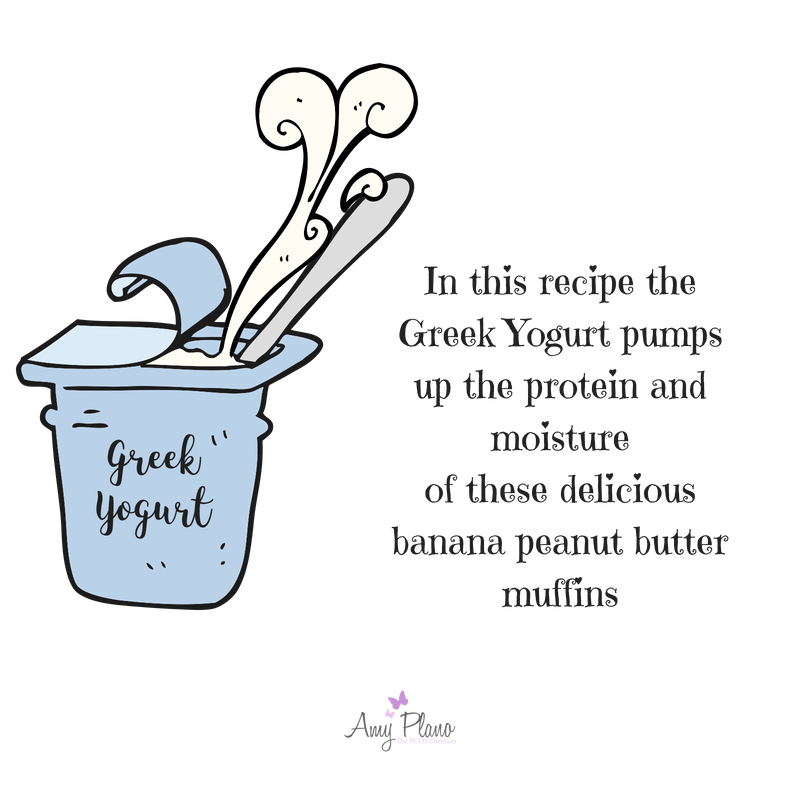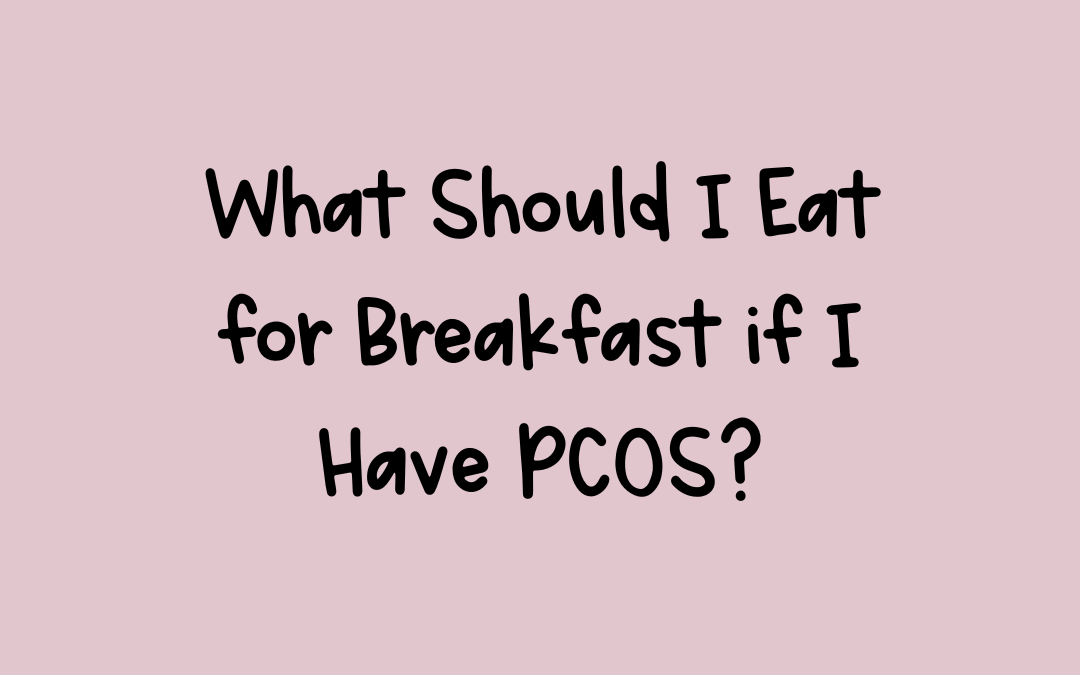
by AmyPlano | May 11, 2023 | PCOS Breakfast Foods, PCOS friendly recipes, Weight Loss
Are you wondering what to eat for breakfast if you have PCOS? Women with PCOS have unique nutrient needs and it is important to plan your PCOS breakfast ideas out accordingly.
Breakfast is one of the most-skipped meals of the day. Many of my PCOS clients come to me at first and admit they aren’t eating breakfast.
I hear lots of excuses for why they are skipping breakfast. Whether it is because you don’t have time, aren’t sure what to eat, or trying to limit your calorie intake, skipping breakfast is actually doing you more harm than good!
A balanced breakfast full of lean protein, complex carbs, and healthy fats, can boost your energy levels, stabilize blood sugar levels, and keep you satisfied until lunchtime. No more feeling “hangry” when 10 am rolls around.
Keep reading to learn why eating breakfast is important for PCOS, as well as six PCOS-friendly breakfast ideas from a specialized women’s health dietitian. Let’s get into it.
Need more PCOS-friendly meal ideas? Make sure you check out my high-protein meal ideas blog next!
Why is Eating Breakfast Important for PCOS?
When they say, “Breakfast is the most important meal of the day”, there is some truth to that statement. Breakfast is essential, especially for women with PCOS, because it starts your day off on the right foot.
It is easy to want to reach for a coffee first thing in the morning and push off eating until later. However, this can cause a dip in blood sugar levels and an increase in cortisol spikes (your stress hormone).
Since women with PCOS are prone to hormonal imbalances, neither of those is ideal for optimal hormone health. Instead, you can support your body to take on the day by giving it the nutrients it needs.
Even further, eating a nutritious breakfast can help prevent reactive hypoglycemia, a sudden dip in blood sugar that occurs after not eating consistently. It can also help improve your insulin resistance, which is a hallmark characteristic of PCOS.
Components of a PCOS-Friendly Breakfast

If you aren’t new to my blog, then you know that I consistently talk about the importance of balancing out your meals. This means trying to have a component from each food group at as many meals as possible. Doing so can help ensure you are hitting all of your nutrient needs!
When it comes to creating a PCOS-friendly breakfast, it’s important to include a balance of lean protein, healthy fats, and complex carbs (preferably high-fiber). These components work together to help stabilize blood sugar levels, promote satiety, and provide sustained energy throughout the morning.
- Some great protein sources for breakfast include eggs, Greek yogurt, cottage cheese, tofu, and lean meats such as turkey or chicken sausage.
- Healthy fats can be found in foods like avocado, nuts, olive oil, seeds, and nut butter.
- Complex, high-fiber carbs can come from options such as fruits, vegetables, oatmeal, whole-grain bread, quinoa, or sweet potatoes.
By incorporating these into your breakfast routine, you can help manage your PCOS symptoms and set yourself up for a successful day.
Importance of Eating Breakfast for Weight Loss
As a PCOS dietitian, I often highlight that women with PCOS who want to lose weight should eat breakfast as part of their daily routine.
Eating a balanced breakfast can help reduce cravings and prevent overeating later in the day. Skipping breakfast, on the other hand, can lead to overeating and poor food choices throughout the day, as well as a sluggish metabolism.
When combined, this can cause unwanted weight gain and make it more challenging to reach your ideal weight.
In fact, research has shown that people who eat breakfast are more likely to lose weight and keep it off compared to those who skip it.
So, if you’re looking to lose weight and improve your PCOS symptoms, make sure to prioritize a healthy breakfast each day!
6 Healthy PCOS Breakfast Ideas
Curious about what a healthy breakfast looks like? Below I will be sharing six healthy breakfast ideas for PCOS. Try these out next time you need some inspiration on how to make your breakfast both delicious and nutritious.
Remember that these are simply ideas and feel free to modify them based on your food preferences.
Mexicali Breakfast Burritos
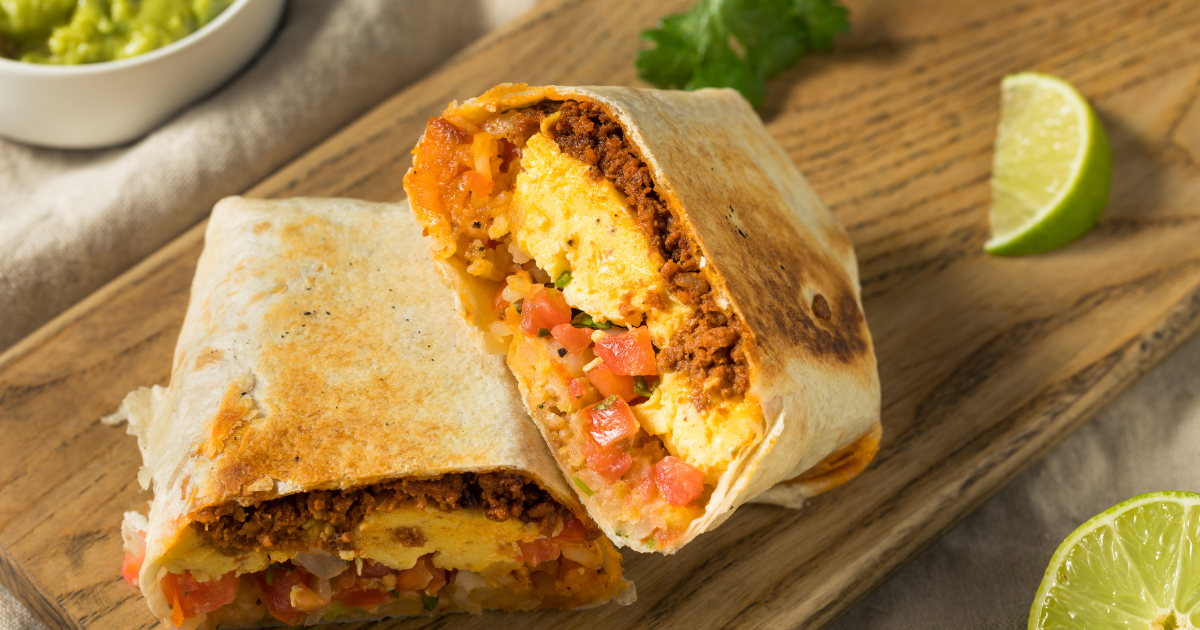
Breakfast burritos are a great balanced breakfast option because you can add whatever you’d like to the inside! These Mexicali-inspired burritos combine eggs with black beans, for an extra protein and fiber boost.
Make a couple of extra burritos, wrap in foil, and freeze them for the days when you are in a time crunch. Simply toss them in the microwave or reheat using an air fryer.
To make:
- Whisk together your eggs, add a splash of milk of your choice, and set aside. Saute diced onions and peppers in a large skillet on medium heat.
- Add black beans and diced tomatoes to the skillet. Next, pour your eggs over top of the vegetables. Cook until the eggs are cooked through.
- Warm whole-grain tortillas in a pan. Assemble your burritos using the toppings of your choice.
- Great options include avocado, salsa, pico de gallo, and fresh cilantro.
Mango Chia Seed Pudding
Chia seed pudding is an underrated breakfast choice. If you are wanting a break from Greek yogurt or can’t stomach dairy, chia seed pudding is a great alternative.
Chia seeds are high in both protein and fiber, making them perfect for a nutrient-dense breakfast. Add your favorite fruits and whole-grain granola on top to complete the meal. Chia seed pudding is also ideal for on-the-go because there is no reheating required!
To make:
- Combine chia seeds, milk of choice, honey, and vanilla extract in a bowl or mason jar. Cover and refrigerate for at least 2 hours or overnight.
- When you are ready to eat, pour chia seed pudding out. Dice up your fresh mango and put it on top.
- For additional crunch, add whole grain granola, coconut flakes, and/or mixed nuts.
Breakfast Sandwich with Sweet Potatoes
Nothing is better than a good breakfast sandwich, right? The key is to use high-quality, PCOS-friendly ingredients such as lean protein sources and whole-grain bread.
Making your breakfast sandwiches at home can lower saturated fat and sodium content. Add a serving of diced sweet potatoes on the side to keep you satisfied until lunchtime.
To make:
- Preheat oven to 400°F. Line a baking sheet with parchment paper.
- Toss diced sweet potatoes with olive oil, smoked paprika, garlic powder, salt, and pepper. Spread the potatoes out on the baking sheet. Roast for 20-25 minutes, or until the potatoes are tender and golden brown.
- In a large skillet over medium heat, fry the eggs. Slice and toast whole-grain English muffins until golden brown.
- To assemble the sandwiches, place a handful of baby spinach on the bottom half of each English muffin. Top with sliced avocado, and a fried egg. Place the top half of the English muffin on the egg to finish the sandwich.
- Throw your diced sweet potatoes on the side for a complete meal!
Tofu Scramble on Toast
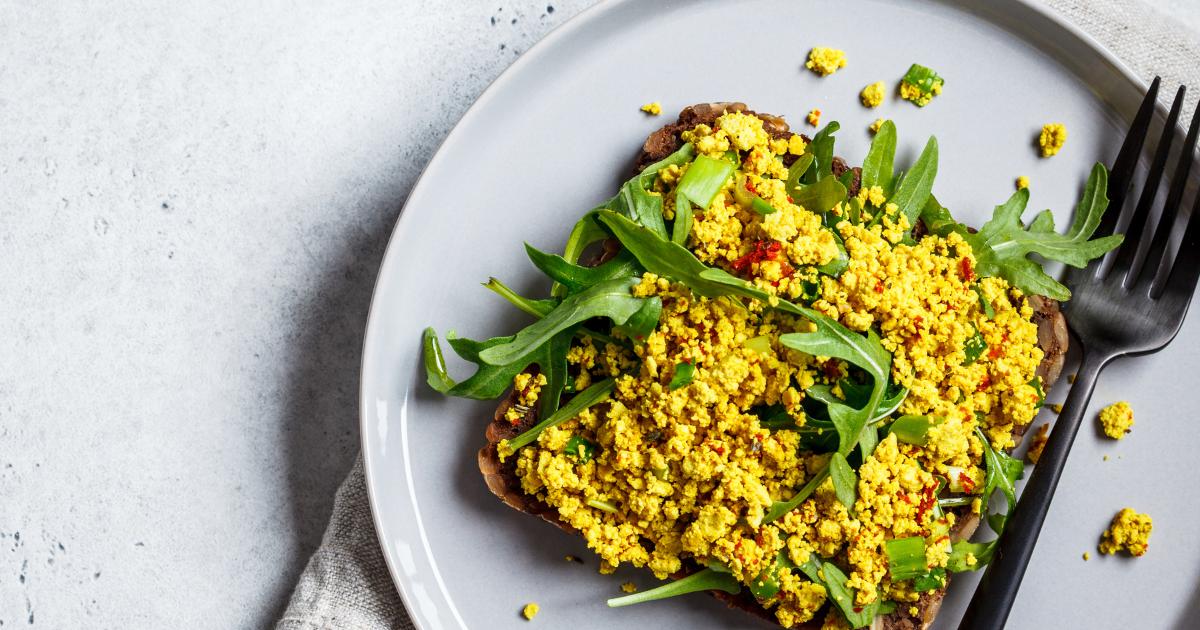
Tofu scramble is a common plant-based alternative to scrambled eggs. So if you don’t eat eggs, or are feeling like changing it up, try this scramble instead.
The secret ingredient is ground turmeric which turns the tofu a familiar yellow color. Turmeric is also said to be anti-inflammatory, making it beneficial for women with PCOS.
To make:
- Heat 2 tbsp of olive oil in a pan. Saute onions and diced peppers.
- Grab your extra firm tofu and crumble it into the pan. Add turmeric, garlic powder, paprika, black pepper, and sea salt. Coat until tofu is cooked through and slightly crispy.
- Toast 2 pieces of whole grain toast. Add fresh arugula and tomato slices to the bottom. Top with your tofu scramble mixture.
Green Protein Smoothie Bowl
While regular smoothies are great, they can sometimes lack sufficient calories and protein to keep you from getting hungry right after.
To combat this, you can create a protein smoothie bowl. By adding in a high-quality protein powder, you are contributing towards hitting your protein goals for the day.
This smoothie bowl is also very nutrient-dense since it is filled with dark leafy greens and healthy fats from the avocado. Avocado in smoothies? Yes, that’s right! It can give your smoothie a more thick consistency and you don’t even taste the flavor.
To make:
- Combine banana, frozen mango chunks, milk of choice, spinach, avocado, and vanilla protein powder in a blender and blend until smooth.
- Pour the smoothie into a bowl.
- Add your desired toppings, such as extra sliced banana, fresh berries, whole-grain granola, unsweetened shredded coconut, or chopped nuts.
Smoked Salmon Sandwich
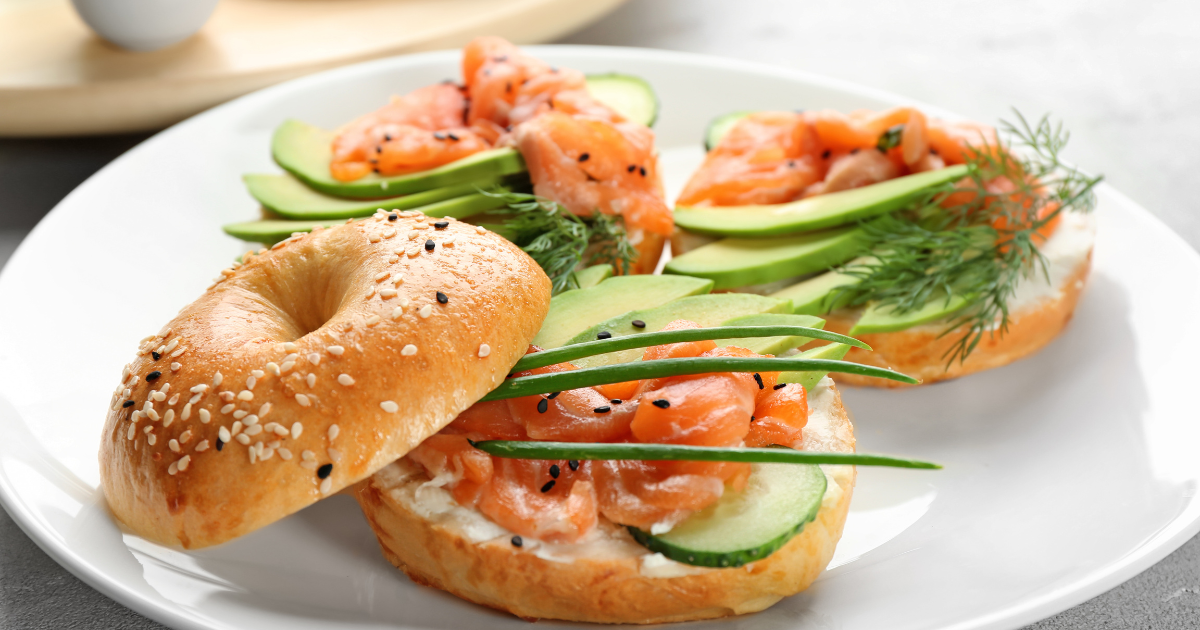
The last breakfast idea I have for you all is perhaps the easiest to make. Smoked salmon bagels are extremely simple and quick to whip together in the morning, with no pots or pans required.
Salmon is a PCOS-friendly food because it is high in beneficial omega-3 fatty acids. You can find sliced smoked salmon at most grocery stores.
To make:
- Toast your favorite whole-grain bagel. Spread low-fat cream cheese on top.
- Add your smoked salmon, fresh dill, cucumbers, and avocado slices.
- Enjoy on its own or with roasted potatoes on the side!
PCOS Breakfast Ideas: The Takeaway
What if you are feeling tight on time in the morning? Don’t worry, this happens to the best of us. Make sure you have easy PCOS breakfast ideas on hand as well for the days you are in a time pinch.
You can also batch-prep many of these meals ahead of time to have over a few days. This can save tons of time in the long run!
Overall, the most important thing is that you are taking the time to fuel your body in some way in the morning. Not only can this promote weight loss, but it can help balance out your hormone levels as well.
Want to take the guesswork out of meal planning? Our customized PCOS meal plans and programs help women with PCOS:
- Improve fertility, lose weight, increase energy levels, improve mood, and more!
Don’t wait another minute frustrated with your PCOS symptoms. Together we can help you lose weight, get healthy AF, and find your happiness again.
Read through my list of comprehensive, effective nutrition programs to find the perfect fit for you. Can’t wait to hear from you!
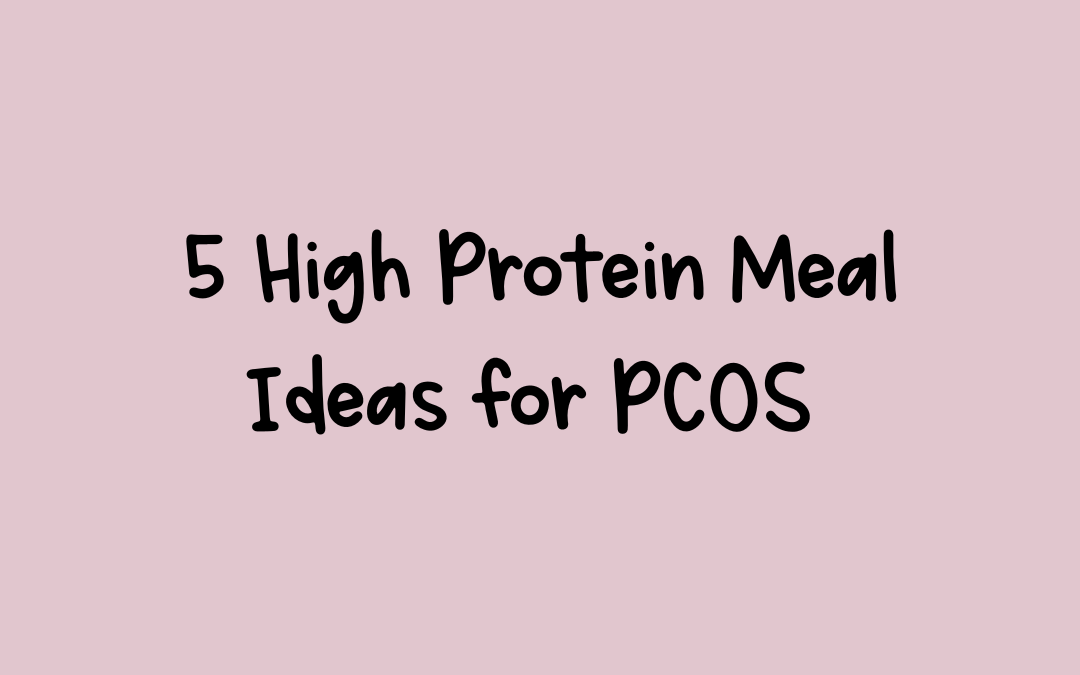
by AmyPlano | Apr 22, 2023 | General information about PCOS, PCOS friendly recipes, Weight Loss
Are you looking for high-protein meal ideas that are PCOS-friendly? Polycystic Ovarian Syndrome (PCOS) is a hormonal and metabolic disorder characterized by irregular or missing periods, increased androgens (male hormones), and multiple ovarian cysts.
While PCOS can cause many unwanted symptoms including acne, abnormal hair growth, and weight gain, a healthy diet can play an essential role in managing these symptoms.
Protein is one of the most important macronutrients for a healthy PCOS diet. Incorporating high-protein meals into your day can help regulate blood sugar levels, reduce insulin resistance, and promote weight loss.
In today’s article, I will be going over how to build a PCOS-friendly dinner plate that prioritizes protein. I will also be providing you with five high-protein meal ideas for when you need some inspiration in the kitchen!
How Can High Protein Meal Ideas Help with PCOS?
When you are first diagnosed with PCOS it can be very difficult to know where to turn and what to eat. Diet is so crucial to managing PCOS symptoms because 50-70% of women with PCOS have insulin resistance.
In general, a PCOS diet should focus on:
- Lean protein sources
- High fiber foods
- Omega-3 fatty acids
- Anti-inflammatory foods
- Low glycemic index foods
Lean protein sources are especially important for PCOS and are what we will focus on in today’s blog. Since women with PCOS are often insulin resistant, their bodies may have a harder time processing carbohydrates.
Protein, on the other hand, has little effect on blood sugar levels and can help regulate insulin secretion, making it an ideal macronutrient for women with PCOS.
Additionally, protein has been shown to promote feelings of fullness, which can help reduce overeating and promote weight loss. Weight loss can be very challenging with PCOS, but is important for managing the condition.
If you need additional guidance, consulting with a specialized PCOS dietitian like myself can help to ensure you tackle your PCOS symptoms and loss weight sustainably.
How do I Build a PCOS Plate?
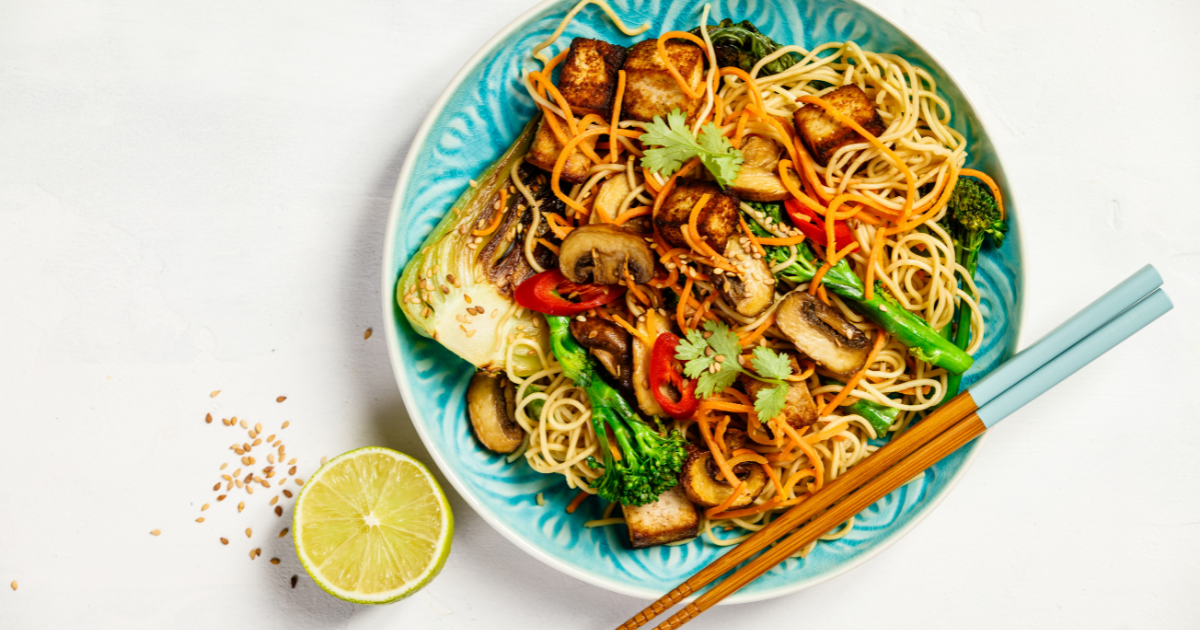
While I give you all the information and the types of foods you should be eating in my PCOS-friendly food blog, I understand the difficulty of taking these separate food components and building them into a meal you look forward to eating.
Here are a few tips for building a PCOS Plate:
- Aim for 20+ grams of protein per meal (3-4 ounces of chicken, meat, or fish)
- Fill half your plate with non-starchy veggies (broccoli, leafy greens, Brussels sprouts, etc.)
- Fill ½ of your plate with whole grains or starchy veggies (potatoes, beans, squash, quinoa, and brown rice)
- Add a healthy source of fat (avocado or olive oil)
Combining all of these elements into a meal will create a blood sugar-balancing plate that will keep you satisfied and your hormones happy- making it perfect for PCOS.
High Protein Meal Ideas for PCOS
Now we will get into some high-protein meal inspirations that are PCOS-friendly. If you are struggling with what to make for your meals, try out one of these ideas below!
Remember that you can modify any of the meals based on your preferences and dietary restrictions.
Quinoa, Tomato, Corn, and Black Bean Salad with Grilled Chicken

Quinoa is a great source of whole grains and also provides a solid amount of protein at eight grams per cup. Creating a quinoa salad full of fresh produce makes for quick and easy meal prep for the week.
Top the salad with 4-6 ounces of grilled chicken or turkey for an extra protein boost to keep you satiated until your next meal!
To make:
- Cook quinoa using the package directions. Add chopped cherry tomatoes, kerneled corn, and black beans.
- Make a dressing mixture with olive oil, lemon juice, balsamic vinegar, and honey.
- Top the salad with 4-6 ounces of grilled chicken. Combine together and serve.
Sheet Pan Salmon, Sweet Potato, and Brussel Sprouts
This sheet pan salmon meal is super easy to prep and makes for easy clean-up!
Salmon provides a great source of protein at 23 grams for 4 ounces. It is also high in beneficial omega-3 fatty acids.
Brussel sprouts are a high fiber, non-starchy veggie great for filling up and giving volume to your plate. Lastly, adding sweet potatoes gives you extra fiber as well as beta-carotene which is converted into Vitamin A in the body.
To make:
- Preheat oven to 400 degrees. Place fresh salmon on a sheet pan lined with aluminum foil.
- Cut up your Brussels sprouts and sweet potatoes. Place around the salmon fillets.
- Drizzle olive oil on top. Sprinkle salt, pepper, garlic powder, and paprika.
- Bake until the salmon reaches the proper internal temperature and the sweet potatoes are tender.
- Enjoy!
Greek Yogurt Parfait with Berries, Chia Seeds, and Flax Seeds

Greek yogurt is a solid source of protein at around 15 grams per serving. Additionally, greek yogurt provides beneficial probiotics for gut health as well.
Topping it off with some fresh berries is a great way to add in some fiber and antioxidants. Combining with other toppings such as chia and flax seeds makes this an amazing blood sugar-balancing breakfast that you can eat on the go.
To make:
- Choose your favorite non-fat Greek yogurt.
- I love Two Good and Fage because of their high quality and low sugar content.
- Wash and prep your berries of choice. Add them on top of the yogurt.
- Choose the rest of your toppings. Ideas include:
- Flax, chia, and hemp seeds, pumpkin seeds, low-sugar granola, mixed nuts, nut butter, and honey for a bit of sweetness.
Tofu and Veggie Stir Fry
For my vegetarian PCOS ladies, a tofu veggie stir fry can be a perfect high-protein meal option to include in your diet. Tofu is a source of soy protein that has been researched to improve insulin resistance and decrease oxidative stress and excess androgens.
To make:
- Press the tofu to dry and season it with garlic powder, pepper, and a little salt.
- Throw into a frying pan with some olive oil and minced garlic and cook till crisp.
- Cook in the same pan broccoli, fresh green beans, and peppers to give the meal some fiber.
- Prepare and cook brown rice noodles according to their package. Brown rice can also be used.
- Top with coconut aminos, a healthier alternative to soy sauce, and enjoy!
Grass Fed Beef and Bean Tacos with Whole Wheat Tortillas

Grass-fed beef is a great source of protein, iron, and B Vitamins. It differs from grain-fed beef because it has less saturated fat which can cause inflammation in the body.
Cooking up ground grass-fed beef with low-sodium taco seasoning serves as a great base for your next Taco Tuesday. Adding black beans to the taco along with sliced avocado and salsa can add some extra flavor as well as fiber and healthy fats.
To make:
- Prep your grass-fed ground beef and saute it in a pan. Add low-sodium taco seasoning.
- Rinse and drain a can of black beans. Add to the ground beef.
- Saute vegetables of your choice, my favorites are roasted peppers and onions, broccoli, and zucchini.
- Heat whole wheat tortillas and start assembling your tacos.
- Top with sliced avocado, salsa, and/or pico de gallo. If you are looking for a healthier sour cream alternative, try Greek yogurt mixed with spices.
High Protein Meal Ideas for PCOS: The Takeaway
There are plenty of meal combinations you can cook up to manage your PCOS symptoms. These are just a few of my favorites that you can include in your meal planning.
Remember to try to include a protein source in as many meals as you can, to promote satiety and improve insulin resistance.
There is not one perfect meal for PCOS and I encourage you to mix it up. Try new foods and recipes to keep things interesting. Eating healthy does not have to be boring!
If you want further guidance on meal planning and nutrition around PCOS, in my nutrition coaching program, we work together to come up with a personalized plan that prioritizes high-protein meals and other macronutrients to achieve your health goals.
Don’t let PCOS control your life, take control of your health today and head over to my services page for support and guidance on your journey to your best health!
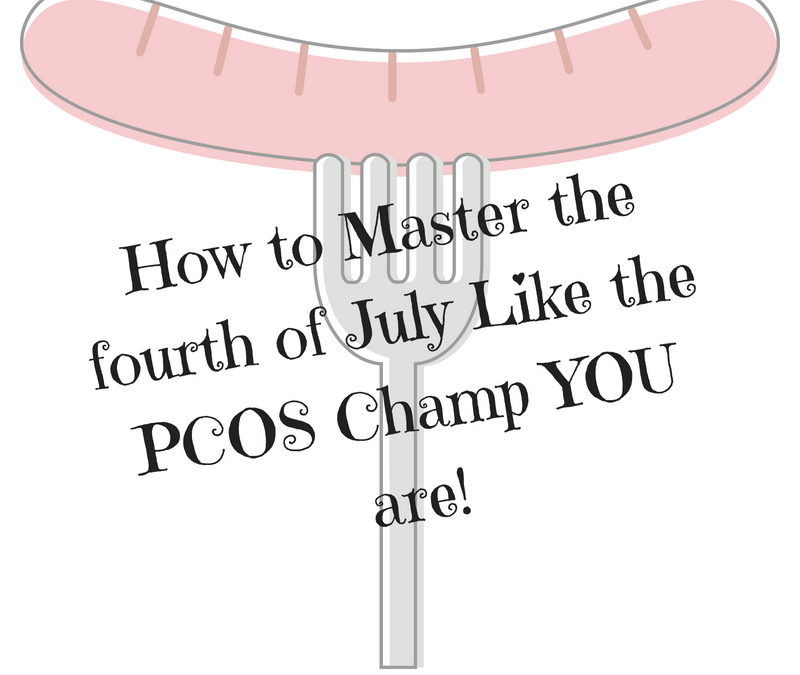
by AmyPlano | Jul 2, 2018 | General information about PCOS, PCOS friendly recipes
Between the crazy highs and unseasonably low temperatures this past week in CT (and freakish Tornadoes) it is hard to believe the fourth of July is just around the corner. However, before you know it, people will be firing up their grills and breaking out the dogs and burgers. Rather than throwing caution to the wind and deciding you’ll jump on the latest detox diet Tuesday, why not stay ahead of the game? There are plenty of ways to keep your holiday healthy, tasty and PCOS friendly for sure!
Sip Responsibly on the fourth of July
Yes – I know this a no brainer! But seriously the fourth of July seems like just like on other reason to carry on with summer drinking. As if people need a reason to drink, right? However, if you are going to imbibe then why not choose to do so responsibly.
Numero uno – avoid the carb bombs. Margaritas, frozen drinks and unfortunately the likes of craft beers tend to be very calorie and carbohydrate heavy. While Craft beers range in calories most clock in at about 200 – 250 calories per 12-ounce bottle. Thinking about knocking back 2-3? You are looking at an upward of 600 calories in alcohol alone.
Side note – back in the day when I used to bartend I would start my shift by making 5 gallon tubs of margaritas. In each batch I would put two full pounds of quick dissolve sugar! Yes – holy moley is right! Sugar rush for sure.
Instead, opt for clear spirits like vodka, gin, and rum mixed with a no/low-calorie mixer. For example, a Titos and Club Soda will only set you back about 95 calories. Plus did you know flavored vodkas (think Stoli Raspberry, Absolut Melon, Pinnacle Whipped Cream) have the same amount of calories as plain vodka? So you can even get fancy and mix a flavored vodka with a flavored club soda squeeze some lime on top and there you have your new favorite skinny summer cocktail.
Looking for the ultimate guide for alcohol and PCOS? The PCOS Dietitian has got you covered! Check out this blog and all things alcohol and PCOS.
Or if hard liquor is not your style – choose a light beer and you are only looking at about 100 calories as well. A glass of white or red wine is about 150 calories. Want to cut those those calories in half? Make yourself a wine spritzer! Fill a wine glass with crushed ice. Then pour 2-3 ounces of wine and 3-6 ounces of your favorite seltzer into a wine glass. Top with sliced fruit. Whallah!
Are the above options not really your jam? How about a low-calorie mojito? Coconut Water and Champagne Punch anyone? These low calorie cocktail from Proof are perfect for those watching their waistline. And let’s be honest – who IS NOT watching those waistlines even on the fourth of July!
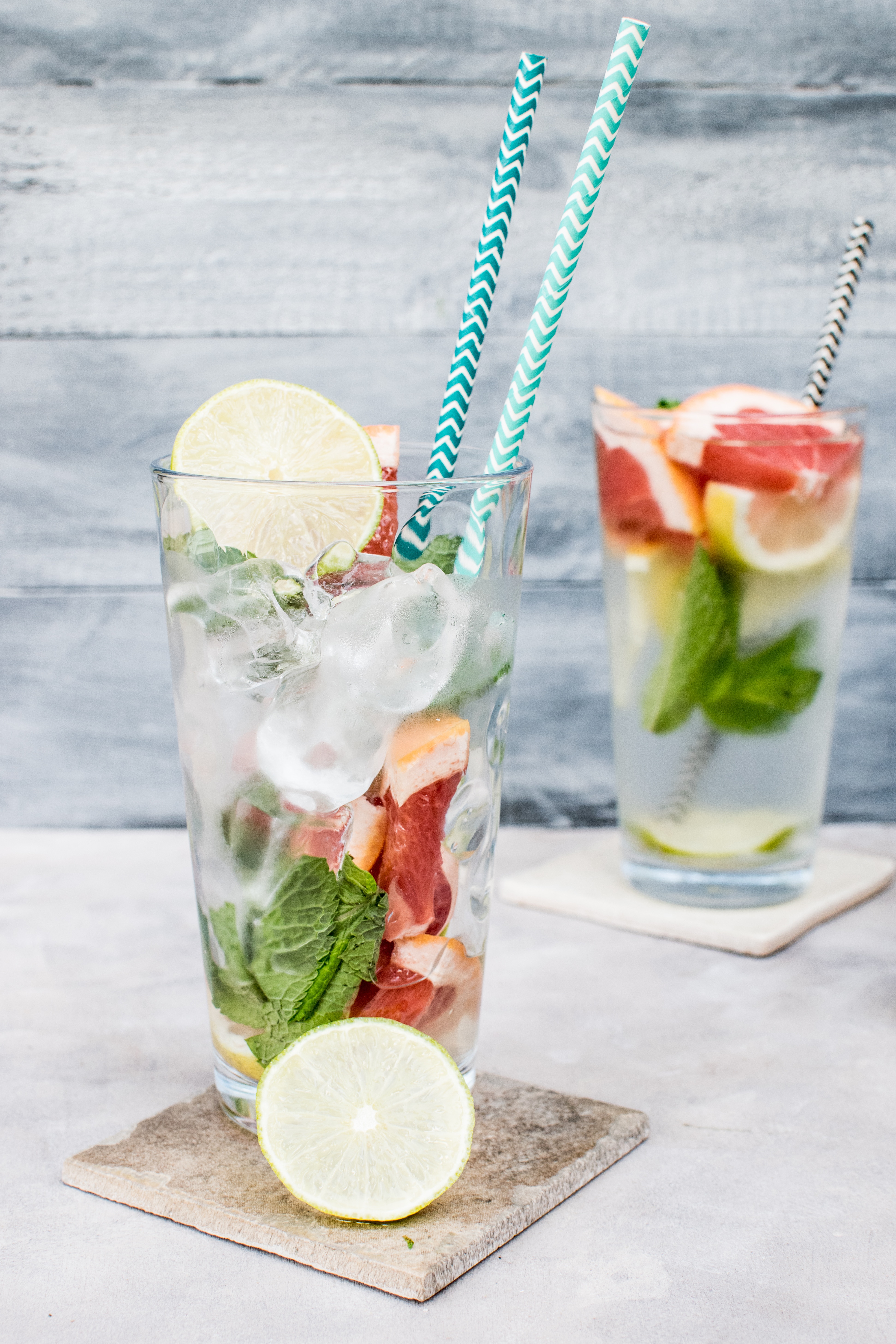
Who says cocktails have to be unhealthy? Not this RD.
Photo by: Monika Grabkowska
Want more information about the calorie counts of your favorite beverages? Check out one of my recent posts on this very topic!
Pump up the Veggies
Often at picnics there are more veggies available than one might think. Sometimes you just need to do a little searching. Crudite platters, tossed salads and even the infamous toppings for burgers are all good places to get those veggies i
Are you trying to watch your carbs? Why not try a lettuce wrap instead of a bun? After all, if 5 Guys offers this option it has to be good, right? You can save yourself 200 calories and 30 grams of carbohydrates by this simple little swap.
Does the green salad look a little weak? Why not grab some of the ‘fixins’ for the burgers (think lettuce, tomato, onions) and ‘doctor’ up the salad (on your own plate, of course!) Or even better yet – offer to bring a kick-ass salad or some sort of veggie based side. Both options often require very little prep aside from assembly. This way you know you will have something to round your plate out aside from Grandma’s tuna mac salad 🙂
Don’t go Hungry
This rule holds fast for any type of celebration including the fourth of July. Never. Ever. Ever. Go to an event hungry.
I repeat. Never. Ever. Ever. Go to an event hungry.
Most of my patients head to an event like a Memorial Day picnic with the mentality they are going to save all their calories for the day for one big meal. They plan to white- knuckle it the whole day until they get to the picnic. This backfires HARD pretty much every time. As soon as they see the food they everything short of bury their face in pretty much everything and anything that is out.
Instead plan accordingly. Have a light breakfast or snack prior to the picnic. Scrambled eggs and fruit, greek yogurt with 1-2 tablespoons of granola, an apple with peanut butter or something even as small as nuts or a cheese stick will keep your hunger at bay.
I much rather see you spend more time on the ‘front end’ in preparing than leave the picnic feeling big, bloated and polluted with an underlying sense of guilt. We all know this feeling! But YOU are stronger than this. Don’t allow yourself to be defeated. Instead plan ahead like the champ you are and leave the picnic with your rock-star status intact.
Keep it Lean and and No one will be Mean
Be a lean mean grilling machine on the fourth of July. After all, nobody goes to a BBQ saying, “I cannot wait to eat super sloppy BBQ food.” If you are the grill master instead choose lean cuts of protein to throw on the coals. Your guests will thank you!
Think 93 % lean ground beef, flank steak, grilled chicken breast marinated in a little balsamic, rosemary and oil, or even a veggie burger (just watch the sodium on those puppies some brands are crazy high!)
Truth bomb – many people opt for a turkey burger thinking it is the best choice. Best as we know is a relative term. Well, it’s not a horrible choice but is it the best choice? I am not so sure.

Did you know that beef burgers and turkey burgers often contain the SAME amount of calories and fat?
Did you know a turkey burger made from “LEAN” ground turkey has just about the same amount of calories and fat (150 – 170 calories & 7 -10 grams of fat for a 4 oz. patty) as a burger made from ground sirloin (93 % lean ground beef)? Lean ground turkey is generally a mix of light and dark meat. So if you are craving a nice juicy burger but are feeling guilty about eating red meat please don’t!
The only exception from a ground turkey standpoint is when the package states “EXTRA” lean. This type of ground turkey has virtually no fat, is expensive and in my humble opinion does not taste very good. It is certainly not good for burgers on the grill. With virtually no fat the burger will be unfortunately very dry.
Be a Good Friend
From my experience as someone who loves to host parties and tells everyone NOT to bring anything – never believe the host. They lie. I love it when someone brings something. SO be that good friend and come bearing food 🙂 This is your prime opportunity to bring something healthy that everyone (including yourself) will likely enjoy.
I can’t tell you how many times my patients say, “There was nothing healthy to eat so I had to eat crap.” Really? Come on my friend. No need to be so lazy! Get off your little butt and avoid all those excuses.
Remember it does not have to be something fancy, complicated or expensive. Heck stop at Costco and grab a veggie platter for $9.99 or a simple fruit bowl (also may I add for only $9.99 at Costco). Even a big old tub of hummus with a bag of baby carrots will likely be appreciated. Pick up a whole watermelon and bring that! After all, who doesn’t like juicy watermelon? The list of healthy options you can bring are seemingly endless.

Want to step up your grame? Why not make a killer salad with everything but the kitchen sink in it? That way you can take whatever comes off the grill and and throw it on top of the salad. You will be surprised how many guests will follow suit. Because like I said, even though Memorial Day is typically synonymous with unhealthy foods, it does not have to be. More people than not are working hard to improve their health. Give people a handful of healthy options and they will thank you for it. A little effort goes a long way!
So whether or not it feels that way right now – the fourth of July is HERE. While I am by no means asking you to be a saint (what fun would that be?) – why not start the summer season on a good foot? You have worked SO hard all winter. Let’s go into summer strong!
Did you survive the fourth of July like a champ? What are your tried-and-true tips for a healthy summer holiday weekend? Leave your favorites in the comments below!
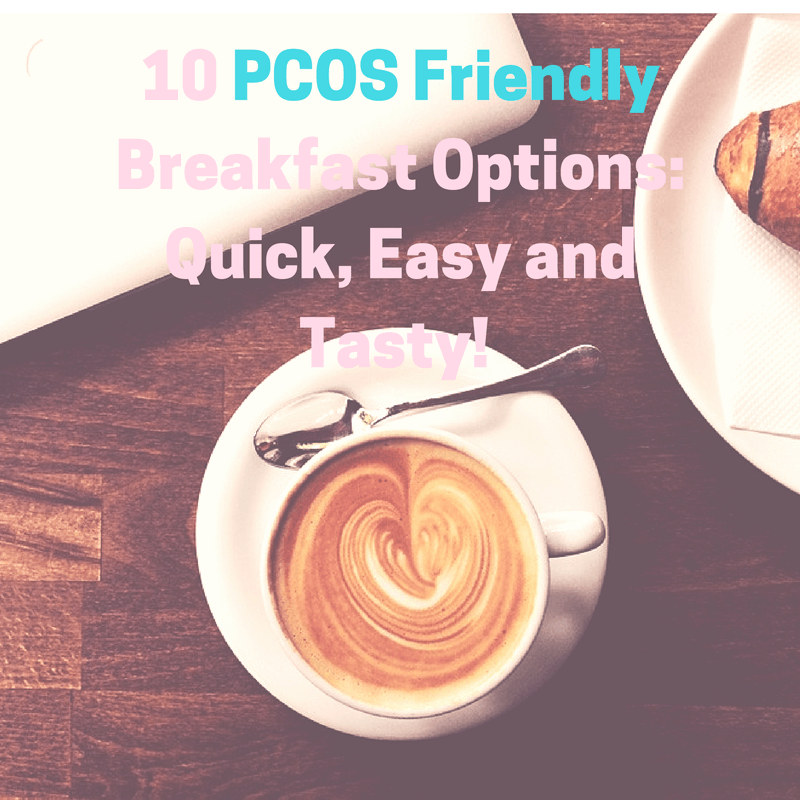
by AmyPlano | Nov 7, 2016 | PCOS and carbohydrates, PCOS Breakfast Foods, PCOS friendly recipes
PCOS Friendly Breakfast Choices
There is no denying it – breakfast is the most important meal of the day. Breakfast gives you energy and provides the body and brain with fuel after an overnight fast. Breakfast can help improve memory and concentration levels. It can also help with weight management as you are less likely to overeat eat later in the day after having a healthy breakfast. But this is easier said than done. Cooking up a PCOS friendly breakfast can be challenging – but it should not have to be. Especially because there are so many breakfast options that are super easy, tasty and healthy
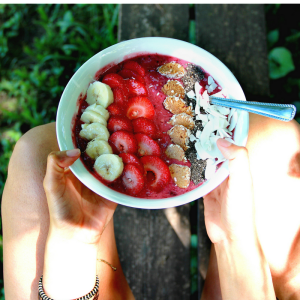
For someone with PCOS, you should aim for a breakfast with 30 grams of carbohydrates or less. In addition, you should do your best to include a protein source to help keep you full longer. Good protein sources include: greek yogurt, organic eggs, cottage cheese, whey protein, nitrate free turkey sausage or low-fat cheese) You don’t want to start your day off super carb heavy – as it will usually set the sluggish tone for the whole day. Plus, jamming down a pile of carbohydrates in the morning is not good for your blood sugar and insulin levels. Most of all, this only sets the scene for your blood sugar to come crashing down. We want to avoid this scenario at at any cost.
Consequently, you are thinking – what the heck can I eat that is quick, easy, tasty AND PCOS friendly? Well the PCOS Dietitian is going to share some of her favorite breakfast choices that fit the bill.
10 Quick and Easy PCOS Friendly Breakfast Choices
1. Make a yogurt parfait with Greek yogurt and add a serving of fruit, nuts, and/or granola. Most of all when choosing yogurt purchase one with less than 15 grams of carbohydrates per serving.
2. Cottage cheese is a great source of protein. As with yogurt, you can add fruit, nuts or even chia seeds to create a more balanced meal. I personally love the Friendship brand. I recommend the 2 % or 4 % fat as they taste pretty awesome.
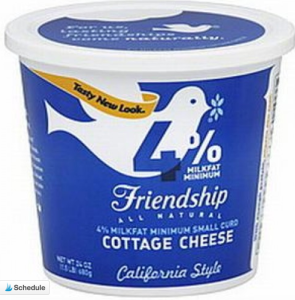
Friendship cottage cheese is my personal favorite! This is because it creamy and has a nice overall favor profile.
3. Make oatmeal (please, use old-fashion oats if you have the time!) and add a source of protein such as nuts, nut butters, protein powder, or milk. Thinking about other cereal choices but not sure where to turn? Check out this past blog on PCOS friendly cereal options. You can also have eggs on the side or scramble some directly into the oatmeal.
4. Have a protein shake. Blend together a small serving of fruit, milk or a milk alternative such as almond or cashew milk, and protein powder. Be creative with your combinations. because the sky is the limit with shakes.
5. Make a breakfast burrito on a low carbohydrate wrap with a couple whole (yes, eat the yolk – that is where all the good nutrition is!) cage free organic eggs, cheese, and tons of vegetables. You can even top of your master piece with a couple tablespoons of black beans, salsa and Greek yogurt to bump up the protein even further!
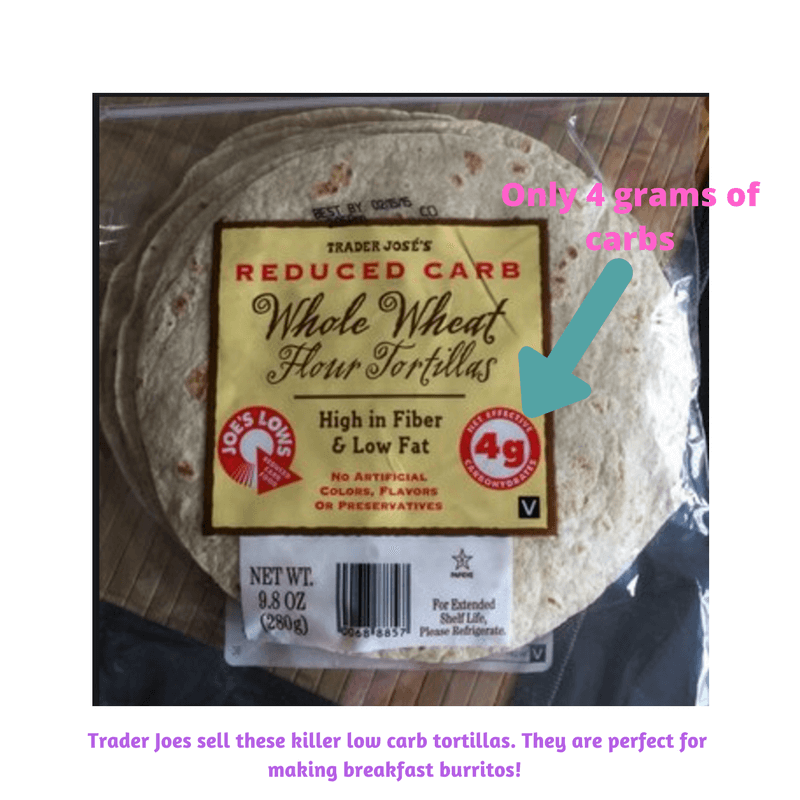
6. How about some tasty, high protein chia pudding packed with omega 3’s and tons of fiber? Check out this awesome chia pudding recipe here from last week’s blog!
7. Make a healthier eggs benedict on ½ whole wheat English muffin topped with vegetables such as steamed spinach and a poached egg. Rather than use regular bacon – swap it for Canadian bacon. You can get the same flavor without all the fat.
8. Omelets are a fun breakfast option. Be creative and add a variety of vegetables. You can also pair it with a side of fruit or toast – just not both!
9. Want something super quick and easy – try my recipe for Chocolate Chip Banana Greek Yogurt Muffins. What’s not to like?
10. Hard-boiled eggs are great for a quick breakfast. Pair them with a slice of whole-wheat toast with peanut butter or small grab and go fruit such as a small banana, small apple or pear. Trader Joes sells eggs that are already cooked – which makes not having a protein with your breakfast not an option for even the laziest of PCOSers!
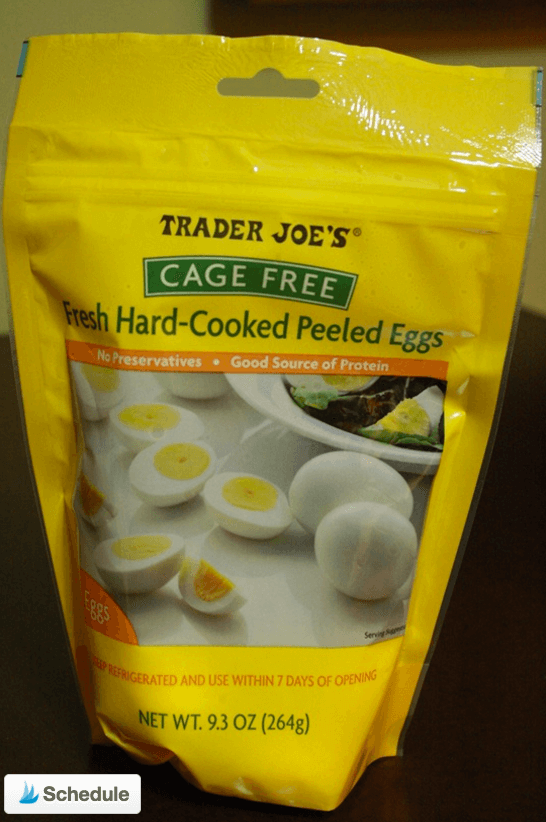
Already cooked hardboiled eggs – what could be easier?!?
Breakfast can be such a challenge but it does not have to be. Hopefully these PCOS friendly breakfast options provide you with some food for thought 🙂 As always, if you are looking for other great recipes please visit my Pinterest page and just search for Amy Plano, The PCOS Dietitian. I am a pinning maniac!
Got quick and easy breakfast choices you would love to share? I know you do! Please share your breakfast ideas in the comments below. As always thanks for stopping by.


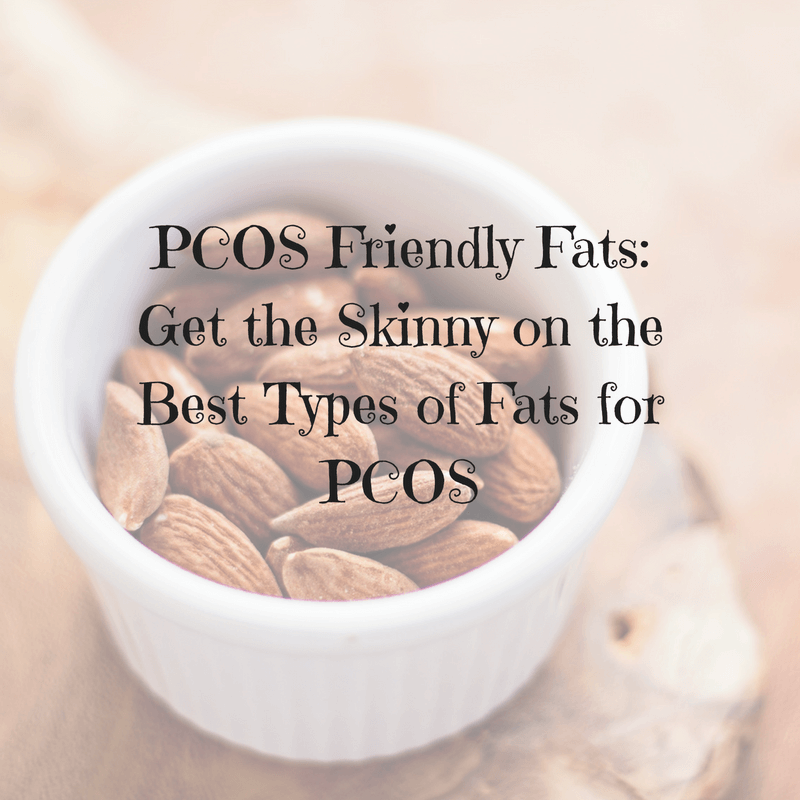
by AmyPlano | Oct 28, 2016 | General information about PCOS, PCOS and Fats, PCOS friendly recipes, PCOS snacks
PCOS Friendly Fats
Did you know that there was such a thing as PCOS friendly fats? Well, if you didn’t thank goodness you landed on my page! I am so happy to have YOU!
There is no denying that fat should be an integral part of any women’s diet. But this is especially true for the diets of women with PCOS. For these amazing women, eating fat (and the right type!) is actual critical to their overall health. There are SO many ways dietary fats are beneficial. Where the heck do I even begin!?!
Number one, they give your body with energy to support cell growth. They also help protect your organs and help keep your body warm. Fats also help your body absorb vitamins, mineral and important nutrients. They also form the backbone of your sex hormones. This last part is especially important, as we know PCOS is a disorder marked by imbalances in hormones. If women don’t take in enough fat then they don’t have the natural resources to correct these imbalances.
Not to mention – fats made us feel FULL! And who does not want to feel full? Fats are such an important part of our diet – yet many women with PCOS tend to shy away from them. And the plot thickens ….

Did you know that women with PCOS are twice as likely to suffer from atherosclerosis than women without syndrome? Yup. This is because many women with PCOS, by nature of the disorder, have several inherent risk factors for heart disease. Many women with PCOS present with central adiposity (excess weight in the belly area), high blood pressure, high triglycerides and low ‘good’ cholesterol levels. All of these risks significantly raise their risk heart disease and stroke.
SO I know what you are probably thinking …

Believe me on this one, cysta!
The simple answer – “Absolutely!” But fret not, the PCOS dietitian is here to give you the skinny on the best types of fats to include in your diet. But I will warn you – the explanation is anything but simple. You see, it critical to note that not all fats are created equal. Some are better for us than others. But even saying that is oversimplifying fats. The quality of fats are dictated by where they come from, how they are processed, raised or prepared as well as additives or preservatives it may contain. All these variables come into play when we considering whether a fat “good” for us or not. In future blogs we tackle the types of fats you should avoid – but onward to the good stuff!
PCOS Friendly Fats
Monounsaturated fats (MUFAs)
Let me count the ways I love monounsaturated fats (MUFAs)! MUFA’s can have a beneficial effect on your heart by optimizing your cholesterol levels. One of the ways that MUFAs do this is that they help lower the “bad” types of cholesterol (LDL) in the blood and while increasing the “good” (HDL) kind.
Tip: When trying to figure out the two cholesterol levels remember it this way: LDL is your lousy cholesterol and you want this level LOW, while HDL is the healthy cholesterol and you want these levels HIGH.
By optimizing these two values you can lower your risk of heart disease and stroke. Furthermore, research supports that MUFAs may also benefit insulin levels and blood sugar control, which can be especially helpful for women with PCOS. Trifecta! Talk about being a PCOS friendly fat! Monounsaturated fats also offer nutrients to help with cell development and provide a good source of vitamin E in the diet. Where can you get your hands on these lovelys? The PCOS Dietitian would not leave you hanging!
Examples of Monounsaturated fats
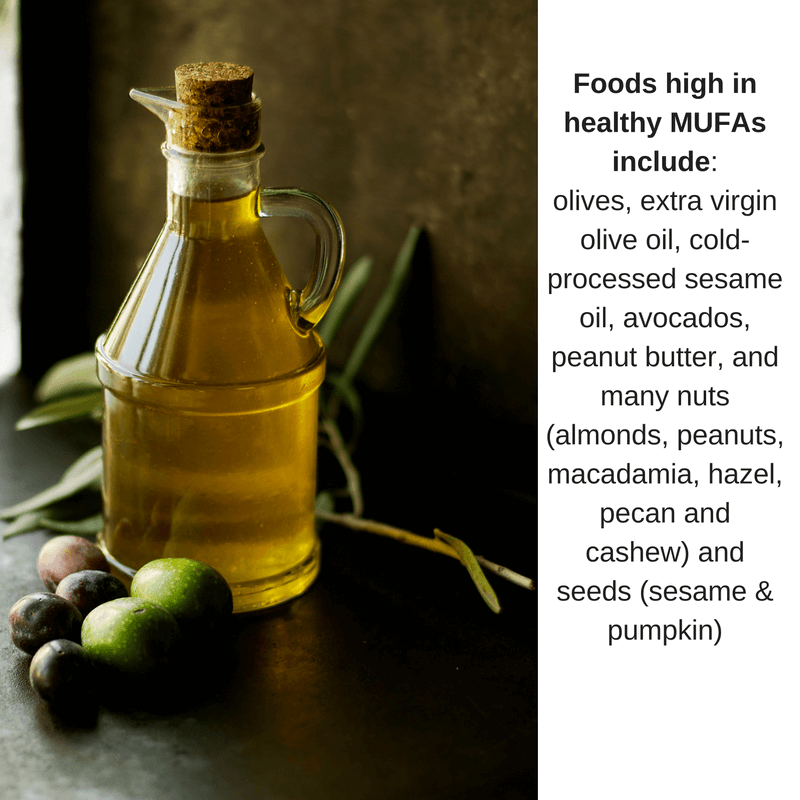
Foods high in healthy MUFAs include: olives, extra virgin olive oil, cold-processed sesame oil, avocados, peanut butter, and many nuts (almonds, peanuts, macadamia, hazel, pecan and cashew) and seeds (sesame & pumpkin)
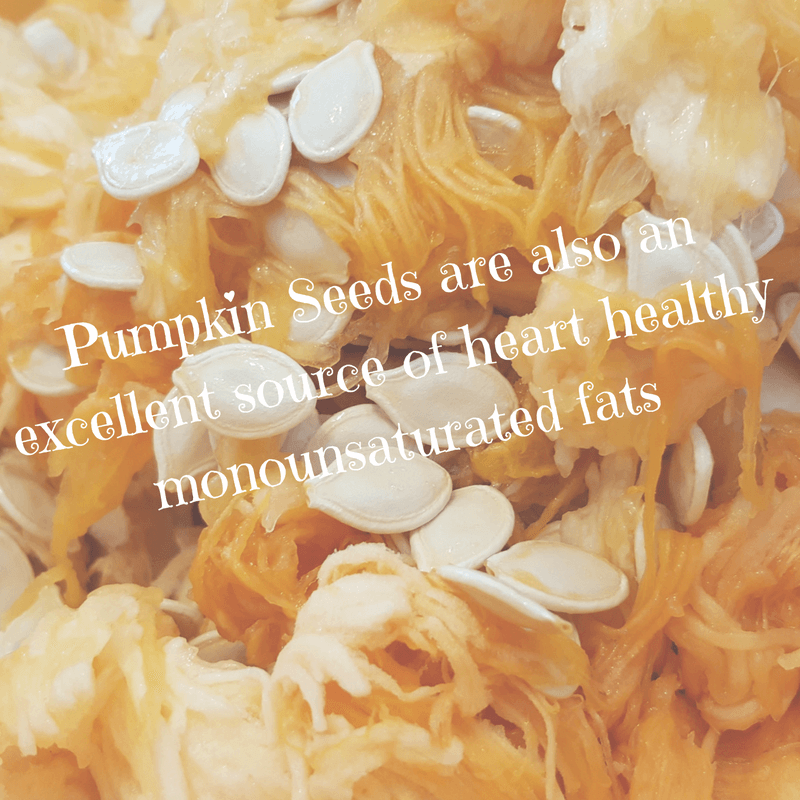
But when speaking of the good – there is always an exception to the rule – Refined Monounsaturated Fats
Canola oil, peanut oil and safflower oil are also monounsaturated fats. However, they are what I would consider modern refined processed oils. The majority of these crops are grown from genetically modified seeds. The oils are treated with high heat and toxic solvents. The processing increases the shelf life of the oils and removes most of the natural flavoring, making them more attractive for the industrial food industry. Please limit your intake of these types of oils as much as possible.
Buying tip: Most olive oils are actually blends of several oils including vegetable oils. Therefore, when buying olive oil look for the California Olive Oil Council (COOC) logo. For Italian olive oils look for (DOP), Spanish (DO) and ones from France (AOC) to make sure it is authentic.
How Much Do You Need of Monounsaturated Fats?
No need to go krazy! All fats, including monounsaturated fats, are high in calories, so use MUFAs only relative to your personalized daily fat requirements. Consume MUFA-rich foods instead of other fatty foods, NOT in addition to them! The goal for your overall fat intake should be around 25-35 % of your total calories. Monounsaturated and polyunsaturated should make up the bulk of this.
Polyunsaturated fats (PUFAs)
Well, I have to say, I have just as much love for PUFAs as I do for MUFAs. When you pour your favorite cooking oil into a pan, there’s a good chance you’re using a polyunsaturated fat. Polyunsaturated fats are used to build cell membranes and line the covering of nerves. They are needed for blood clotting, muscle movement, and for controlling inflammation. Studies support that eating polyunsaturated fats in place of saturated fats or highly refined carbohydrates reduces harmful LDL cholesterol and has a positive effect on the cholesterol profile. They can also help lower triglycerides.
Examples of Polyunsaturated fats
Examples of foods high in polyunsaturated fats include: walnuts, sunflower seeds, organic tofu, soybeans, and fatty fish such as salmon, mackerel, herring, and trout.
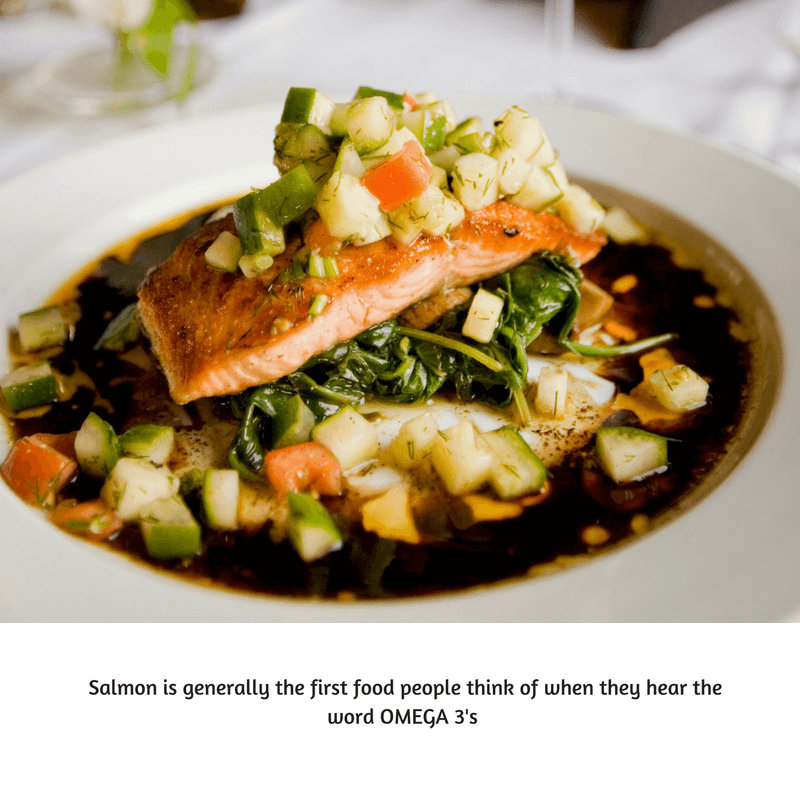
Note – just like the monounsaturated oils – canola, safflower and peanut oil – soybean oil, corn oil, sunflower oil also fall under the same ill as those modernized processed oils. They too are highly processed oils that go through an insane amount of processing with chemical solvents, steamers, neutralizers, de-waxers, bleach and deodorizers before they end up in the bottle. So please, when possible reduce their use in your cooking and limit your general consumption of foods that contain them.
Omega 3 Fatty Acids – Superstars
But on a much more positive note, I bet you have heard of the superstar Omega 3 fatty acids! Omega 3 fatty acids are essential fats the body cannot produce. Therefore, we need to consume these guys in the diet.
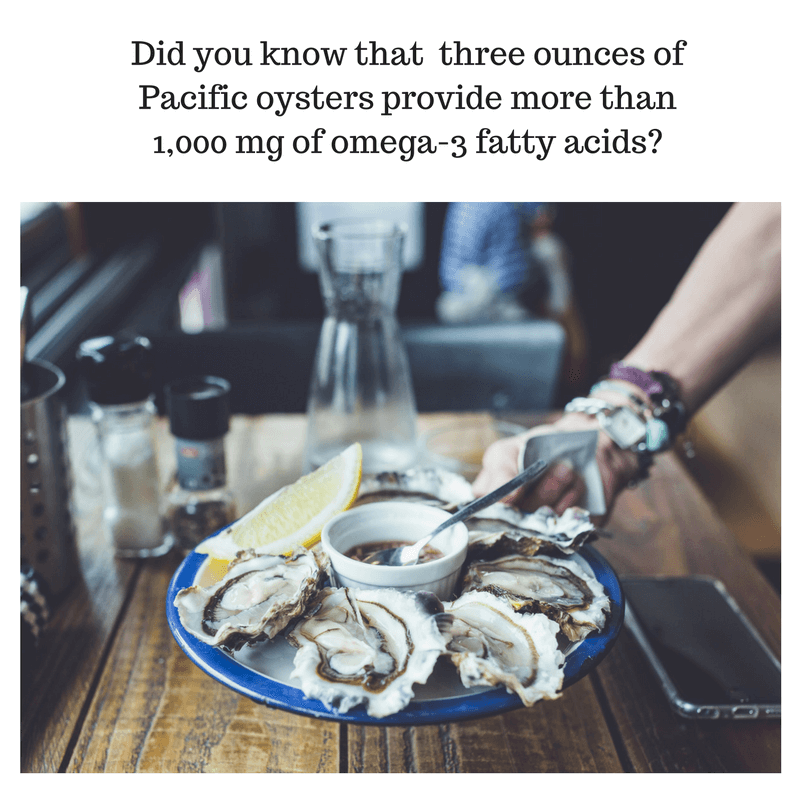
Did you know that there are three different types of omega 3 fatty acids? The three types are DHA, EPA & AHA. DHA and EPA are the preferrable form and are found in foods like cold-water fish and algae. While ALA is found more in plant foods such as nuts and seeds, as well as in grass-fed beef.
The Benefits of Omega 3 Fatty Acids
The benefits of omega 3 fatty acids are seemingly endless! When consumed in right amounts they are known to help with everything from promoting a healthy pregnancy, to decreasing the risks for depression, dementia and even memory loss. Inflammation in the body can damage your blood vessels and lead to heart disease and stroke. Omega-3 fatty acids may decrease triglycerides, lower blood pressure slightly, reduce blood clotting, decrease stroke and heart failure risk and reduce irregular heartbeats. Not too shabby, right?
Examples of Foods Containing Omega 3 Fatty Acids
Foods that are high in omega 3’s include salmon (wild caught & sockeye), herring, mackerel, anchovies, oysters, sardines, pole & line caught tuna and lake trout. Vegetarian sources include algae (seaweed) walnuts and flax.
Buying tip: Polyunsaturated fats are much more vulnerable than monounsaturated fats. PUFAs are sensitive to light, air and sunlight. Therefore, keep foods high in PUFA’s away from direct light and when permissive keep in the refrigerator to prevent them from going rancid.
How Much Do You Need of Polyunsaturated Fats?
As important as PUFAs are there is no set requirement. However, the American Heart Association recommends eating at least 6 ounces of cold-water fish twice per week. If you do not like fish or feel like you are falling short on your intake, you may want to talk to your physician about a supplement. It’s especially important to consult your health care provider if you are pregnant or breastfeeding, if you take medicine that affects blood clotting, if you are allergic to seafood, or if you are considering giving a child an omega-3 supplement.
Still stumped on how to get more PCOS friendly fats in your diet? Let the PCOS Dietitian give you some fun and fresh ideas.
Five Ways to Incorporate More PCOS Friendly Fats Into Your Diet
1. Go nuts!
Snack on nuts instead of salty, carb-laden pretzels and chips. Nuts are a great source of heart healthy fats, super tasty and even come in single serving bags. Just make sure to keep your serving to around ¼ cup which equals around 180 calories, 14 grams of fat (almost all mono & polyunsaturated!), 6 grams of protein and 6 grams of carbohydrates.
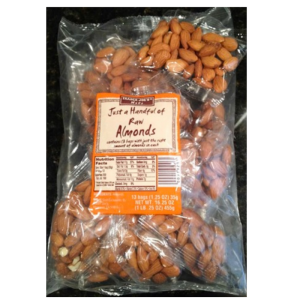
Tip: Trader Joes sells pre-portioned almonds and cashews called ‘Just a Handful of Almonds.” If you are looking for something with a bit more spice and kick the Emerald brand sells 100-calorie packs of flavored cashews, almonds and walnuts. The flavors range from Siracha, to jalapeño to chocolate and cinnamon. These are great to throw in your car, desk drawer or car. They travel extremely well.
2. Become Sandwich Savvy
Replace your cheese and/or mayonnaise on your sandwich with sliced avocado or even guacamole. This quick little swap decreases your intake of unhealthy fats while boosting your intake of monounsaturated fats. It also adds a whole new dimension to your ho-hum lunch!
Tip: It seems like it always so hard to get avocados ‘just right.’ They always seem to be too hard or too ripe. Just a quick tip if they are green and unripe is to put them in a brown bag (just like you would other fruits!) and that will speed the ripening process. On the flip side, if you have an avocado on the counter that looks perfect – but you are not ready to use it – throw it in the fridge. This will halt the ripening process.
3. Nut Butters
Nut butters – need I say more?!? I sometimes wish nut butters were a food group. If they were I would be SO in love!
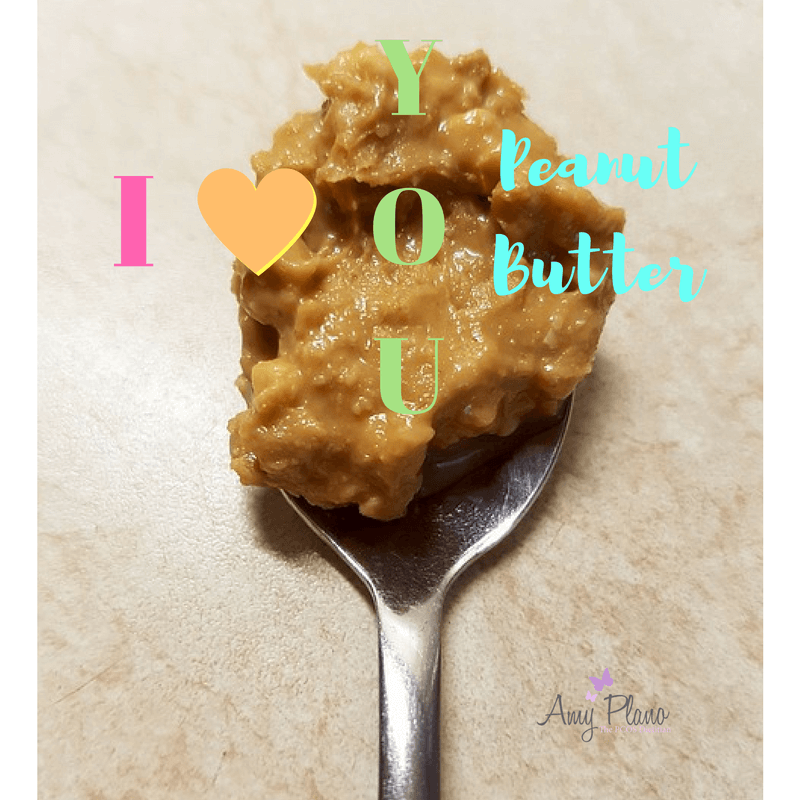
Nowadays you can get almost every nut in spreadable form. Gone are the days when you could just get peanut butter. Now you can get cashew, almond, and hazelnut butters and my personal favorite – sunflower seed butter! Spread any of these heart healthy butters on celery, apples, bananas or even swirl into your morning oatmeal. But just like any fat be mindful that each tablespoon of nut butter packs a whopping 100 calories and 6 grams of fat. Yes, it is healthy fat – but next thing you know that “little” bit of peanut turned into half the jar. Sounds familiar?
Tip: When buying peanut butter always go organic! The crops are heavily sprayed and no one needs all those chemicals in their body. Also brands such a Skippy & Jiff (unless they state they are “natural”) contain hydrogenated fats – so don’t touch those bad boys with a ten-foot pole.
4. Cha-Cha-Cha-Chia
Discover the magic of chia seeds. Chia seeds are loaded with fiber, calcium, antioxidants and Omega 3’s. They are a true super food. You can pretty much buy them in any grocery store including the obvious ones like Trader Joes and Whole Foods. A small bag goes for around $6 – $8 depending upon the brand. A small bag supplies well over 40 servings!
You can sprinkle on your yogurt, blend into your smoothies or make some killer chia pudding! See my recipe below for this tasty treat.
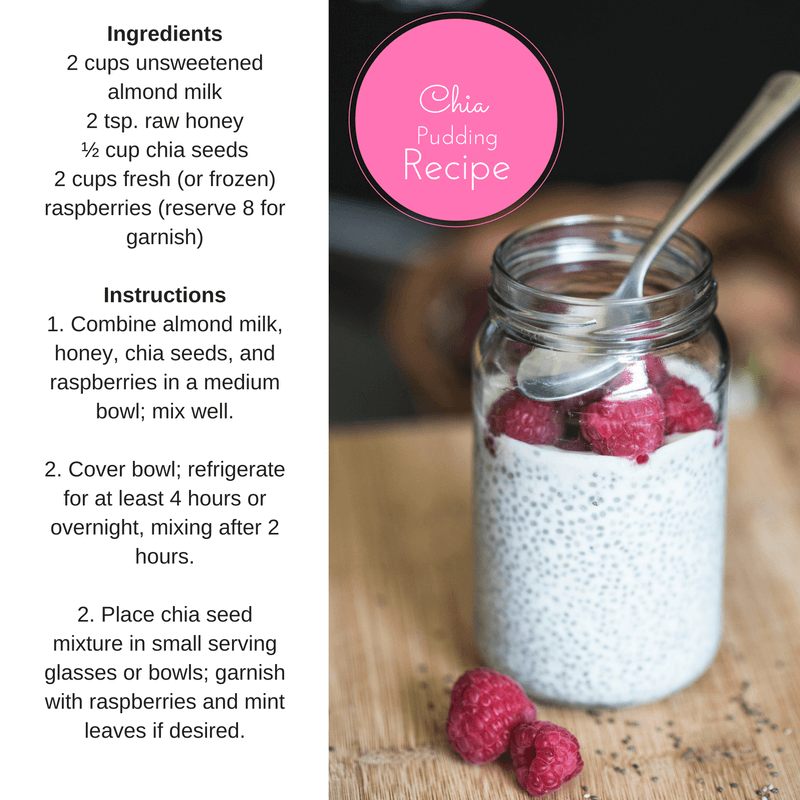
Tip: Remember what we said about polyunsaturated fats like Omega 3’s? They are vulnerable to oxidation. Storing them in the refrigerator will extend their shelf life. However, most chia seeds come in special vacuum-sealed packaging. These packages can be stored at room temperature until they are opened. Once opened, throw the whole bag in the fridge to maintain their freshness.
5. Make your own salad dressings
Making your own salad dressing is SO easy! Once you start doing this – you will be ashamed you ever bought the crap in a bottle. Plus, it a terrific way to get your PCOS friendly fats in AND your greens.
I urge you experiment with different types of oils when making your dressings. Have you tried avocado oil? It is a super mild oil that blends nicely with various vinegars, acids such as lemon and lime. How about walnut oil? It pairs awesome with balsamic and maple syrup. Check out the recipes below. You can always tweak the ingredients to suit your palate!
Avocado Vinaigrette
Ingredients:
3 tablespoon Avocado Oil
1 tablespoon Apple Cider Vinegar
1/2 clove Garlic, grated or crushed
Zest of 1/2 Lemon
1/4 teaspoon salt
1/4 teaspoon back pepper
For the Vinaigrette:
Whisk all ingredients in a small bowl. Top off your favorite bowl of salad greens!
Lighten-Up Lemon Walnut Salad Dressing
Ingredients:
1/4 cup red wine vinegar
2 tablespoons minced shallots (onions will work, too!)
2 tablespoons walnut oil
1 tablespoons REAL maple syrup (you can adjust up or down depending upon how sweet you like it!)
1 tablespoon fresh lemon juice
1/2 teaspoon salt
1/4 teaspoon freshly ground black pepper
Preparation
Combine all ingredients, stirring with a whisk. Store in refrigerator for up to 1 week. A mason jar is a great storage vehicle.
Phew that was a lot of info! Hopefully I have convinced you of all the awesome benefits of including PCOS friendly fats in your diet. Rather than shy away from, you know have the important tools to make the most educated decisions when it comes to which fats to choose to support your PCOS. But as always I would love to hear your thoughts. What are some of your favorite MUFAs and PUFAs? What are your strategies for fitting them in your diet? Tell us in the comments below!



by AmyPlano | Jul 19, 2016 | PCOS and carbohydrates, PCOS friendly recipes
High Protein Banana Chocolate Chip Muffins
- 1 cup (225 g) plain Greek yogurt (I used 2 % as that is what I typically buy!)
- 2 medium ripe bananas (200 g or 1 cup mashed)
- 2 large eggs
- 2 cups (160 g) rolled oats (old fashioned or quick)
- 1/4 cup (50 g) brown sugar unpacked (I used Truvia Brown Sugar – Baking and only needed 1/8 cup)
- 1 1/2 tsp baking powder
- 1/2 tsp baking soda
- 1/2 cup (85 g) chocolate chips, mini or regular
Instructions:
- Preheat oven to 400F (204C) and prepare a muffin pan by spraying the cavities with cooking spray or lining them with paper liners**. Set aside.
- Add all the ingredients except for the chocolate chips to a blender or food processor and process on high until the oats are broken down and batter is smooth and creamy. Stir in chocolate chips by hand.
- Pour batter into prepared muffin pan, filling each cavity until it is about 3/4 full. Optional: sprinkle a few chocolate chips over the top of each muffin.
- Bake for 15-20 minutes, until the tops of your muffins are set and a toothpick inserted into the middle comes out clean. Allow muffins to cool in pan for ~10 minutes before removing. Store in an air-tight container for up to a week.
** if you decide to use paper liners just give them a quick spray with Pam or Cooking Spray just so you get the muffins out easier without sticking.
As noted above: Nutrition Info: 178 calories carbohydrates: 30 grams protein: 7 grams fat: 4 grams
With Truvia Brown Sugar & 2 % Greek Yogurt: Nutrition Info: 189 calories carbohydrates: 29 grams protein: 8 grams fat: 5 grams
Add 1 tablespoon butter = + 120 calories, 0 grams of carbohydrates, 12 grams of fat
Add 1 tablespoon natural peanut butter = + 90 calories, 4 grams of carbohydrates, 4 grams of fat





